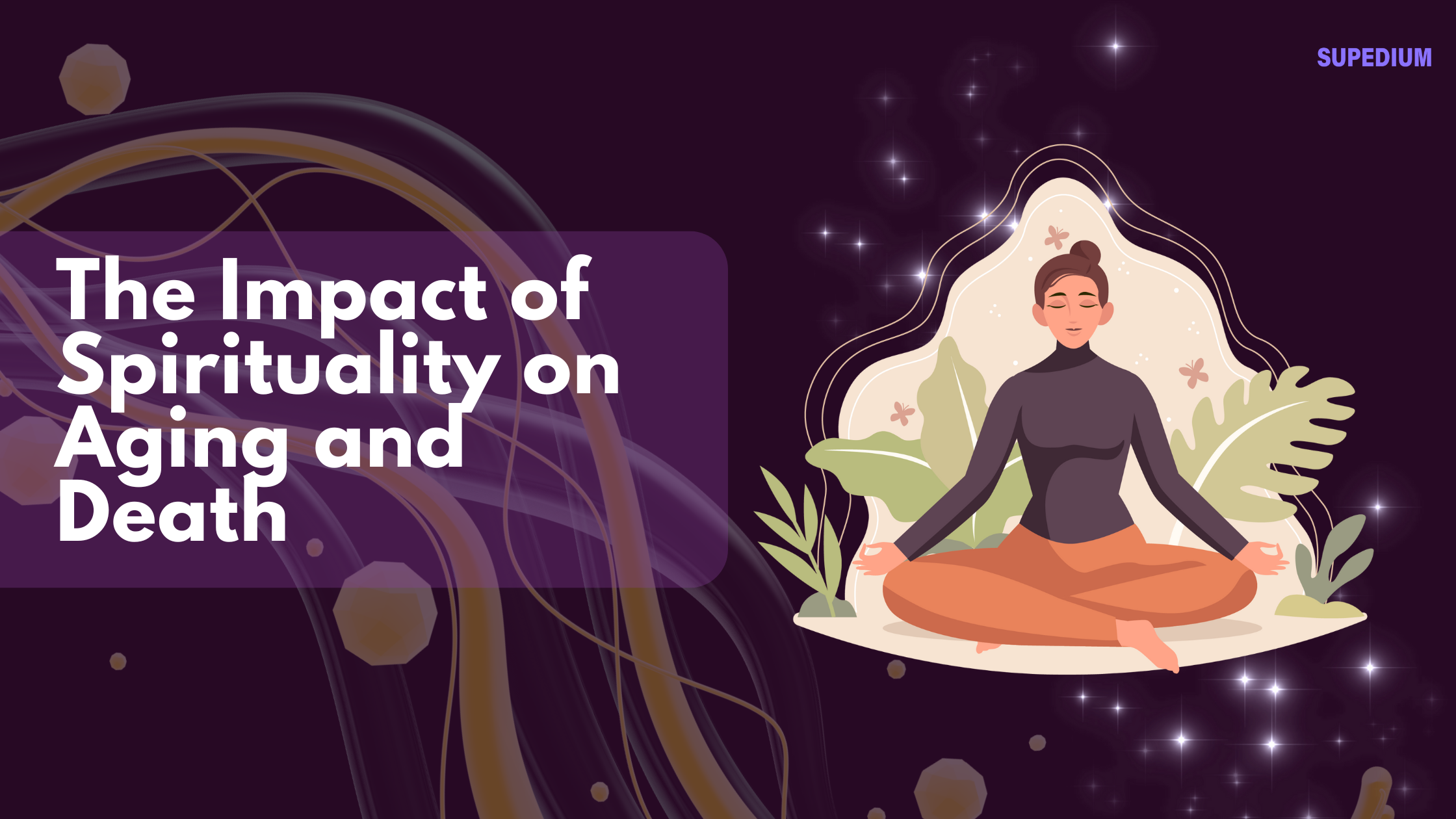Table of Contents
![]()
Introduction
Spirituality, while often intertwined with religion, extends beyond doctrinal boundaries to encompass a broad range of personal beliefs and practices that foster a sense of purpose, connection, and transcendence. In the context of aging and death, spirituality can profoundly influence how individuals experience these stages of life, offering comfort, meaning, and a framework for understanding their journey. This article explores the impact of spirituality on aging and death, examining psychological, social, and health-related aspects and presenting insights from research and personal accounts.
Spirituality and Aging
Psychological Impact
As individuals age, they often face challenges such as physical decline, cognitive changes, and the loss of loved ones. Spirituality can play a crucial role in shaping their psychological well-being. A strong sense of spiritual connection and purpose can enhance life satisfaction, helping older adults navigate the complexities of aging with a positive outlook. Studies have shown that spirituality can mitigate symptoms of depression and anxiety by providing a sense of meaning and continuity.
For instance, individuals who engage in spiritual practices may experience increased resilience in the face of health issues. A study published in the Journal of Gerontology found that older adults with higher levels of spiritual well-being reported better mental health and a stronger sense of purpose compared to their less spiritually engaged peers.
Social Impact
Spirituality often fosters a sense of community and belonging, which is particularly valuable for older adults. Spiritual practices such as attending religious services, participating in spiritual groups, or engaging in community volunteer work can enhance social networks and provide emotional support. These social connections can counteract feelings of isolation and loneliness that may arise with age.
Intergenerational interactions also benefit from spirituality. Spiritual traditions frequently emphasize respect for elders and family cohesion, which can strengthen relationships between older adults and younger generations. For example, in many cultures, spiritual rituals and family gatherings serve as opportunities for sharing wisdom and maintaining familial bonds.
Health Outcomes
Research indicates that spirituality can positively impact physical health. Spiritual practices such as meditation, prayer, and mindfulness have been associated with lower levels of stress, improved immune function, and even longer life expectancy. For example, a longitudinal study published in Health Psychology found that individuals who engaged in regular spiritual practices had a lower risk of cardiovascular disease and longer lifespans.
The mind-body connection facilitated by spirituality may contribute to these health benefits. By promoting relaxation and reducing stress, spirituality can help manage chronic conditions and improve overall well-being.
Case Studies and Research Findings
Personal accounts illustrate the transformative power of spirituality in aging. For example, an elderly woman named Margaret found solace in her daily meditation practice, which she credited with helping her cope with chronic pain and maintaining a positive outlook on life. Research also supports these findings; a study in The Gerontologist highlighted that spiritual engagement was linked to reduced symptoms of depression and improved quality of life among older adults.
Spirituality and Death
Attitudes Towards Death
Spiritual beliefs significantly influence attitudes towards death. Different spiritual traditions offer various perspectives on mortality, such as beliefs in reincarnation, an afterlife, or the continuity of the soul. These beliefs can reduce fear and anxiety about dying, providing comfort and a sense of readiness for the end of life.
For instance, many Buddhist traditions view death as a transition rather than an end, emphasizing the impermanence of life and the importance of preparing the mind for this transition. This perspective can help individuals approach death with equanimity and acceptance.
End-of-Life Care
Spirituality plays a vital role in end-of-life care by addressing the emotional and spiritual needs of patients. Palliative and hospice care often incorporate spiritual support to enhance comfort and quality of life. This may include spiritual counseling, rituals, and support from religious or spiritual leaders.
Research in The Journal of Palliative Medicine indicates that patients who receive spiritual care alongside medical treatment experience less anxiety and greater satisfaction with their care. Spirituality can guide end-of-life decisions, helping individuals align their care with their values and beliefs.
Grief and Bereavement
Spirituality also impacts the grieving process, providing coping strategies and support for those who have lost loved ones. Spiritual beliefs and practices can offer solace and a sense of connection to the deceased, aiding in the healing process. For example, rituals such as memorial services, prayers, and spiritual reflections can help individuals find meaning and closure.
A study published in Death Studies found that individuals who engaged in spiritual practices during bereavement experienced lower levels of grief and improved psychological well-being. Spiritual communities can also provide crucial support, offering empathy and companionship to the bereaved.
Case Studies and Research Findings
Personal stories highlight the comfort that spirituality can provide at the end of life. For example, John, a terminally ill patient, found peace through his religious faith and spiritual practices, which helped him face his final days with a sense of calm and acceptance. Research supports these experiences; a study in The Lancet found that spiritual and religious coping mechanisms were associated with lower levels of distress and better quality of life among terminally ill patients.
Comparative Perspectives
Different Spiritual Traditions
Spirituality varies widely across different traditions and cultures, each offering unique perspectives on aging and death. For instance, Christianity often emphasizes the promise of eternal life, providing hope and comfort to believers facing the end of life. Buddhism teaches the concept of rebirth and the importance of achieving enlightenment, which can shape attitudes towards death.
Hinduism introduces the concept of karma and moksha, viewing death as a step towards liberation from the cycle of rebirth. Indigenous and alternative spiritual practices often involve rituals and ceremonies that honor the deceased and guide them to the afterlife.
Cultural Variations
Cultural backgrounds influence how spirituality shapes experiences of aging and death. For example, in some cultures, spiritual rituals and community involvement are integral to the aging process, while others may emphasize individual spiritual practices. Understanding these cultural variations can enhance the effectiveness of spiritual care and support across different populations.
Practical Implications
Integrating Spirituality in Elder Care
To address the spiritual needs of older adults, it is essential for caregivers and healthcare professionals to receive training in spiritual care. This includes recognizing and respecting diverse spiritual beliefs and practices and incorporating them into care plans. Programs that integrate spirituality can enhance the quality of life for elderly individuals by addressing their holistic needs.
Policy Considerations
Policy frameworks should consider the role of spirituality in health care and end-of-life care. Advocating for spiritual care within public health policies can improve the overall well-being of older adults and support them through aging and death. This includes funding for spiritual care programs and ensuring that spiritual needs are addressed in healthcare settings.
Conclusion
Spirituality profoundly impacts aging and death, offering psychological, social, and health-related benefits. By providing a sense of purpose, community, and comfort, spirituality can enhance the quality of life for older adults and support them through the end-of-life process. Continued research and attention to spiritual needs in care settings can further improve the experiences of aging and dying, ensuring that individuals are supported holistically and respectfully.
Share This





Be the first to comment